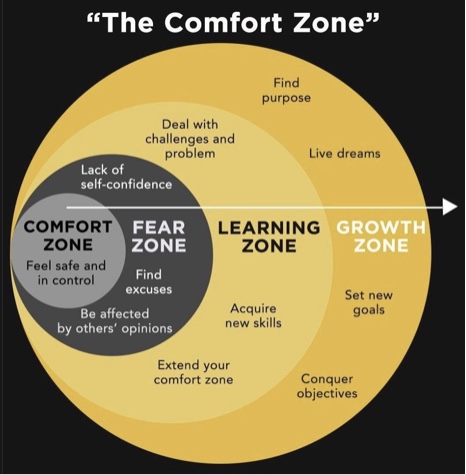Don’t go seeking conflict and confrontation, but don’t be afraid of it either. Both extremes are not good. Have a back bone and stand up for what you believe in, but do it tactfully and respectfully as to keep the negotiation going. If you shut a conversation or idea down, you’re treating it as a win-lose situation. That may be necessary for some things (hostage negotiations, for example), but if you want to have a long, meaningful relationship with that person there needs to be some “give and take.” If you always win (or lose), eventually that other person won’t want to deal with you anymore.
Category: business
Getting out of your comfort zone

Most of the best things in life happen at the edges of your comfort zone. If you only want to feel comfort, you’ll be less likely to branch out/try new things, to overcome adversity, learn new skill sets, etc.
The higher degree of difficulty, the less comfortable most people are with trying to tackle that problem. If you’re willing (and able) to solve that problem, and if you can find a way to solve the problem for others too, you often are compensated (monetarily) for it. Most people want to stay in their comfort zones and are willing to trade money for comfort (paying someone else to solve their problems). There’s nothing wrong with this. We all do it, and depending on the stage of life we’re in, it may be a smarter financial decision to pay an expert/specialist to do something more efficiently so you’re not wasting your non-renewable resource (time) on something you don’t know how to do well and will end up with a worse finished product than if the expert did it in the first place.

Real life Inception
People are emotional, not rational. Appeal to their emotions first and then help to rationalize their decision. If you can get them to articulate how they feel about something, if you can get them to self actualize or self realize it, the idea will stick. If you tell them how to feel, they will know that the idea did not come from themselves and they will be more likely to dismiss it down the road. It’s just like the movie Inception – they have to feel like the idea originated from themselves.
No means no (for now)
No doesn’t mean no forever. It means no for now. It means not yet. It means that your current offer hasn’t enticed them enough or that they are not motivated enough to accept your offer. No isn’t the end of the discussion, it’s the beginning of the negotiation. If you really want to make a deal, don’t stop at no. Dig deeper and see what relatively minor concessions you could give to the other party (which may be of little value to you, but greatly valued by them) to sweeten the deal.
Empathy as a starting point for negotiation
Listening shows empathy. When people feel listened to and understood, they are more likely to work with you. You can work in tandem towards a common goal (or at least a compromise) much easier if you start out by showing that you are listening to them.
When you truly listen to somebody and they can feel you are listening to them, it’s a sign of respect. That’s why you have to start out with empathy and active listening to obtain the best results in any negotiation or sales process. It’s important to use both empathy and active listening throughout any conversation, but especially at the start, because first impressions really do count for something. Don’t dig yourself into a hole before you really get started by disrespecting the other person/party.
You have to understand what it is that the other side wants. What is the issue they want solved in order to provide the best response. What is their pain point and how we can alleviate their pain?
If you go in with the same sales pitch every single time, it may work in certain situations, but your solution may be completely wrong for them in other situations. Listen, dig deeper, and empathize with what they are feeling to show respect and to get further in negotiations.
Go into every negotiation or sales pitch with one thing in mind: How can we make this a win-win situation so both sides leave happy, nobody leaves holding a grudge over the other side, and you don’t hurt yourself in future business with that person or their friends?